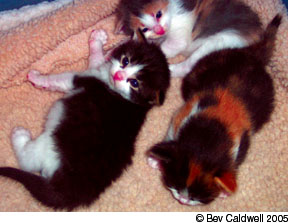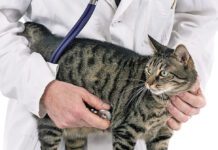At first, I thought he was just gaining weight, recalls Steve Dale, as he speaks about Ringo, his Devon rex kitten. Dale, a nationally syndicated pet columnist and radio talk show host based in Chicago, tackles important issues like feline disease on a regular basis. Still, he was unprepared for the devastating news from his veterinarian three years ago that his beloved Ringo had contracted feline infectious peritonitis (FIP).
FIP never occurred to me, says Dale. It didnt take long for me to realize that something was really wrong with Ringo. I was just leaving for a veterinary conference, so I asked my wife to take Ringo to the veterinarians office. A few days later, as I was sitting on a plane, awaiting take-off to return home, my veterinarian called and gave me the grim diagnosis. That ended up being the longest flight of my life.

288
Still reeling from the news, the Dales cancelled their much-anticipated vacation to Mexico. They remained at home and cared for their beloved kitten as best they could until, just a few short weeks later, Ringo succumbed to the disease.
What Is FIP?
The viruses that cause FIP are believed to be mutant forms of very common – and normally fairly harmless – viruses called feline coronaviruses (FCoV). For reasons that are largely unknown, these viruses mutate and take on the ability to cause FIP, a fatal disease that primarily attacks kittens and young adult cats (usually under two years of age). FIP is often nicknamed the purring disease, because infected kittens will spend so much time snuggling and purring – perhaps because they are feverish and are struggling to stay warm. Even though scientists and veterinarians have known about FIP since the 1960s, there is still neither prevention nor cure.
Dr. James Richards, director of Cornell Universitys Feline Health Center, estimates that up to 50 percent of all household cats are infected with the virus. However, he stresses, it is not typical for the virus to cause FIP. Coronaviruses are extremely common, he says. Many cats are exposed to the virus and many are infected with it. FIP, however, is a very rare consequence of the viral infection. It primarily occurs in kittens and young adult cats in multiple cat environments such as animal shelters and breeding facilities. In most cases, cats can become infected with coronaviruses and remain perfectly healthy for their entire lives.
This is actually good news for cat owners who are concerned about their kitten becoming infected. Many have questioned whether they should euthanize their virus-infected feline. The answer is a resounding no. Just because a kitten has become infected with FCoV does not mean that the virus will mutate and cause FIP. However, if the kitten does develop FIP, the obvious question becomes: Why? There is no simple answer and experts have varying theories. One school of thought is that there may be a genetic component to the disease: Some cats, because of their genetic makeup, are more prone to contracting the disease than other cats.
Perhaps no one knows this better than Dr. Niels Pederson, a veterinarian and director of the Center for Companion Animal Health at the University of California School of Veterinary Medicine at Davis. He has studied the virus and disease extensively for more than two decades and, in fact, developed a blood test for antibodies to feline coronavirus.
We know that both immunity to the mutant virus and to the common parent coronavirus are under some genetic control, notes Dr. Pedersen. Unfortunately, we have never had accurate diagnostic tests for FIP, and in fact many healthy cats have died because of incorrect diagnoses.
Stressors That May Trigger FIP
Many experts believe that, in addition to being genetically predisposed to FIP, kittens that have been heavily stressed are more apt to develop the disease. Stressful situations include:
Adoption into a new home
New addition to the household (another pet, baby)
Trauma (i.e., being hit by a car)
Other illnesses
Family moving to a new home
Spaying/neutering (This is not to say that we should not spay or neuter our kittens. It is still vitally important to do so in order to reduce the pet population and to prevent many health-related problems associated with unaltered cats.)
How Caronavirus Is Transmitted to Other Cats
Feline coronavirus is highly contagious and can be passed from cat to cat through the saliva and the feces. Most cats become infected by inhaling or ingesting the virus, either by direct contact with an infected cat or by contact with virus-contaminated surfaces like clothing, bedding, food bowls or toys. Although the virus can survive in the environment for a number of weeks, it can be eliminated by most household detergents and disinfectants. Maintaining extremely clean litter boxes, limiting the number of cats in a household or cattery and eliminating stress-inducing situations can help a cat ward off the disease.
Different Forms of FIP
There are two major forms of FIP: effusive (wet) FIP and noneffusive (dry) FIP, as well as a combination of both. The most definitive sign of effusive FIP is the accumulation of fluid within a cats abdomen and/or chest, causing, in essence, a beer belly. When excessive fluid accumulates, it may become difficult for a cat to breathe normally. The onset of noneffusive FIP tends to happen more slowly and its characteristics are much more difficult to discern.
Is a Future Without FIP Possible?
Sadly, cats diagnosed with FIP face a bleak future – once clinical signs appear, most cats will live only a short time. Still, there is hope. New ways to diagnose and treat FIP are being studied at universities and organizations around the world and discussed at symposia. New vaccines are showing promise in the fight against the disease and are giving researchers reason to be cautiously optimistic.
On the bright side, progress is being made on developing vaccines for the mutant, FIP-causing virus, says Dr. Pedersen. Vaccines against the common parent virus have not proved effective, but this may also change with time.
While news of these impending treatments came too late to save Ringo, Steve Dale is still committed to making a difference in the lives of cats. He has made it his personal quest to see that this deadly disease is eradicated once and for all.
I expect that, in my lifetime, there will be a cure for FIP, he says emphatically. I am raising money for research and, perhaps more importantly, Im raising awareness. I just hope that someday, somehow, there will be no more FIP.



